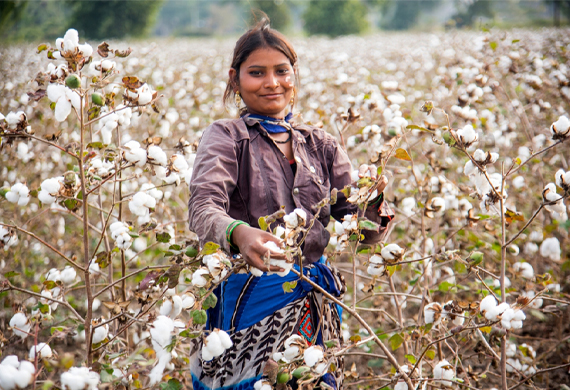
Climate Change Largely Impacts Women Cotton Farmers in India, Pakistan & Bangladesh
By: WE Staff
Climate change disproportionately impacts women across the world. A recent report by CottonConnect titled ‘Women in Cotton: Addressing the Impact of Climate Change through Climate-Friendly Practices’ delves into the hardships women cotton farmers in India, Pakistan, and Bangladesh face owing to climate change.
Women cotton farmers play a vital and often underappreciated role in the global agricultural landscape. A significant cash crop, cotton is grown for its fibers, which are used in textiles and other Industrial products. Women have actively participated in cotton farming, making significant contributions to the cultivation and production of this vital crop.
Women cotton farmers are the backbone of their communities in many parts of the world, working tirelessly to plant, care for, and harvest them. Beyond the field, they are involved in many different facets of the cotton value chain, including seed selection, planting, ginning, processing, and marketing.
Despite making numerous significant contributions, female cotton farmers face particular difficulties and barriers. These difficulties include unequal access to opportunities for education and training as well as restricted access to resources like land, credit, and agricultural inputs. Women often bear additional burdens as a result of traditional gender roles and societal norms because they are expected to balance household and caregiving responsibilities along with handling agricultural responsibilities.
Report by CottonConnect on Women Cotton Farmers of India, Pakistan and Bangladesh:
In India, Pakistan, and Bangladesh, female cotton farmers have suffered a great deal as a result of climate change. The difficulties faced by women cotton farmers in these nations are due to frequent changes in the climatic conditions, as highlighted in a report by CottonConnect, a social enterprise with headquarters in London.
According to the report titled, Women in Cotton: Addressing the Impact of Climate Change through Climate-Friendly Practices states that the climatic changes are due to extreme weather conditions that lead to detrimental impacts on biodiversity, crop yield, and pest management. In addition to this, women's health and wellness have suffered. Women act as multitaskers as they efficiently handle both the farm and their household duties, despite their time constraints or health issues.
The importance of empowering female farmers through education in sustainable agriculture and climate change awareness is a must and needs to be implemented majorly as emphasized in the report. Positive change can be attained by highlighting the voices of women and learning from their experiences. It is also essential to interact more with women farmers in order to learn from their first-hand experiences.
The report further states that, beyond increasing farm productivity, empowering women in the cotton value chain can enhance living standards and food security. Recognition of the crucial role that female farmers play in the productivity of small-scale cotton farming and taking steps to assist them in climate change adaptation are both imperative.
The three nations where female cotton farmers have faced major downfall and difficult situations due to extreme climate changes are India, Pakistan, and Bangladesh. CottonConnect conducted a research study in June 2023, speaking with over 100 women program farmers, partners, and experts from these three nations. The purpose of this study was to comprehend how climate change affects female cotton farmers and evaluate the efficiency of the intervention.
The Women in Cotton programs have already attracted more than 164,000 women, helping to meet the ambitious target of training 500,000 women by 2030. The roles that women farmers play in agriculture are significantly impacted by changing weather patterns and extreme events. Reduced crop yields caused by erratic rainfall and protracted droughts put the food security of households dependent on agriculture at risk.
The effects of climate change also increase the social and economic vulnerabilities of Bangladeshi women by having a direct impact on their access to food, water, and sources of income. The extreme weather worsening by climate changes negatively impacts biodiversity, crop yield, and pest control in all three countries.
Statistics on how Climate Change is affecting Women Cotton Farmers in the three nations:
India
The Women in Cotton programs have already attracted more than 164,000 female participants. In rural India, Women make up the majority of the agricultural workforce but they still have very few financial resources and very limited land ownership rights.
Pakistan
From an average of 3.0 million hectares between FY03 to FY12, the average area under cotton cultivation fell to 2.6 million hectares between FY13 and FY22. The cotton planted land decreased from 2.1 million hectares in FY21 to 1.9 million hectares in FY22 which resulted in a vast number of job losses in the cotton and textile industry.
Bangladesh
More than 19,100 women have made disaster support systems in the 10 adversely affected regions of the country whereas more than 1,600 women have been able to grow their businesses due to the training provided to them.






